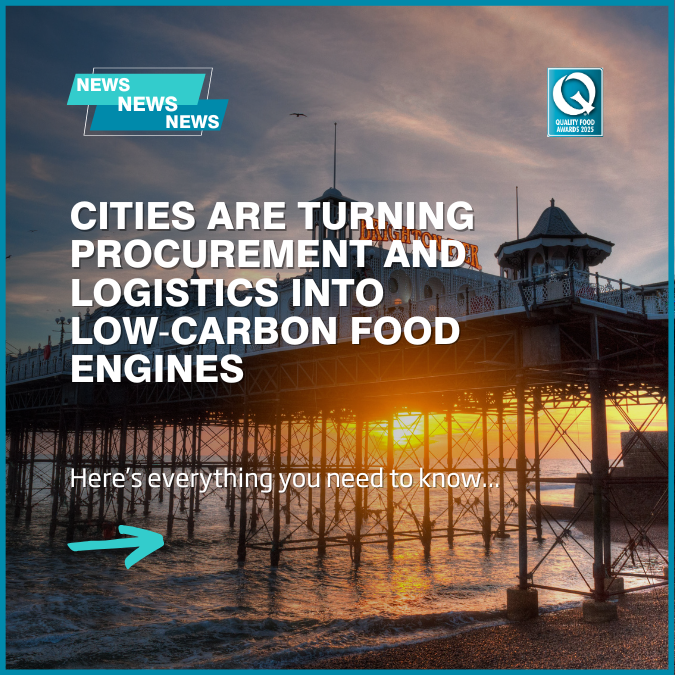
Cities are turning procurement and logistics into low‑carbon food engines
A new city‑by‑city ranking shows ten UK urban areas using procurement standards, redistribution schemes and low‑emission logistics to make food sourcing more traceable and reduce the sector’s environmental footprint — with Brighton & Hove, Manchester and Nottingham offering practical models for wider adoption.
People are asking more insistently where their food comes from and what it leaves behind. A recent city‑by‑city ranking of sustainable food supply chains points to a growing shift in how local authorities, wholesalers and businesses approach sourcing, distribution and waste — driven as much by consumer concern about origin and traceability as by climate targets. According to national consumer research, shoppers remain particularly anxious about the quality and safety of imported food, and interest in domestically produced, traceable supplies rose markedly in 2022, reinforcing pressure on supply chains to become more transparent.
The city ranking, compiled from council reports, sustainability indices and local partnership activity, highlights ten urban areas that are experimenting successfully with different pieces of the greener food puzzle. The list is not simply a roll call of initiatives; it reflects an emerging ecosystem in which procurement policy, community redistribution, logistics innovation and supplier engagement interact — a model promoted nationally through awards and the Sustainable Food Places network that celebrates joined‑up, local delivery.
At the centre of the list are cities with distinctive approaches. Bristol is singled out for citywide food‑waste reduction and an active zero‑waste retail scene; Edinburgh for farm‑to‑table links and council sustainability targets; Brighton & Hove for early, formalised sustainable catering standards in public institutions; Manchester for piloting low‑emission logistics hubs; Leeds for rapidly expanding urban agriculture and redistribution schemes; and other cities on the list — Belfast, Glasgow, Nottingham, Cardiff and Sheffield — for combinations of local procurement, composting, electric delivery trials and award‑winning food partnerships. These examples show the range of levers available to reduce the carbon and environmental footprint of urban food systems.
Brighton & Hove offers a concrete example of how procurement can drive change. The council’s Good Food Standards set compulsory criteria for food served in hospitals, schools and other public settings, awarding procurement points for sourcing local UK produce, Fairtrade goods and lower‑impact ingredients. The standards were developed with the city’s Food Partnership and map directly onto the city’s wider carbon‑neutral ambitions, demonstrating how public contracts can create reliable demand for more sustainable suppliers.
Changes in urban logistics are equally visible. In Manchester, the launch of cargo‑bike hubs and low‑emission last‑mile services has been framed as a pragmatic way to remove vans from congested streets, cut exhaust emissions and improve air quality. The roll‑out of bike and hub networks, developed in partnership with local delivery companies, is already being used to move parcels and essentials and is being extended to support local businesses and public services.
Nottingham’s recent electric van trial shows another practical route to decarbonising distribution. A two‑year programme that combined funding support, vehicle pilots and workplace charging installations helped dozens of local businesses trial battery‑electric and plug‑in hybrid vans and produced plans for a much larger fleet conversion. Participants cited reduced operating costs and a clear intention to switch to low‑emission vehicles as outcomes, underlining how targeted local programmes can overcome barriers to electrification.
Wholesalers are also repositioning themselves to meet these changing demands. Pentagon Food Group says it has seen a surge in orders for sustainably sourced produce and greener packaging in the last three years, and that buyers increasingly judge suppliers on traceability, waste performance and emissions. A company spokesperson told Edinburgh News: “It’s not just about what’s on the plate, it’s about the journey it takes to get there.” The firm’s corporate social responsibility material further describes partnerships with domestic growers, fleet‑management goals and supplier auditing, claims that, if realised at scale, would help connect city‑level procurement ambitions with supply‑chain practice.
For businesses the commercial logic is straightforward: consumer preference and public procurement criteria are raising the price of admission for sustainability. Industry research and public surveys show that traceability, safety and a preference for local product are material factors in purchase choices — meaning restaurants, caterers and retailers can gain a competitive edge by rethinking sourcing, inventory and distribution. Practical steps include prioritising verified sustainable products, working with wholesalers who can demonstrate local sourcing and traceability, and reconfiguring logistics to reduce food miles and packaging waste.
The most durable successes appear where policy, community organisations and private suppliers collaborate. The national awards and network that recognise exemplary local partnerships underline that progress often comes from coordinated governance: procurement standards, redistribution schemes, business support for fleet electrification and urban logistics pilots together build resilient, lower‑carbon supply chains. That patchwork of initiatives also highlights a pragmatic truth — there is no single silver bullet, but rather a portfolio of interventions that cities can tailor to local markets and infrastructure.
The ranking is a snapshot of momentum rather than a final verdict. Cities and suppliers are at very different stages of implementation and many of the gains cited remain partial: commitments on paper must be matched by investment, monitoring and independent verification. Nonetheless, the ten cities spotlighted show how public policy, logistics innovation and supplier adaptation can combine to shrink the environmental footprint of food in towns and cities, and signal what other places might replicate when they align procurement, business incentives and community action.
